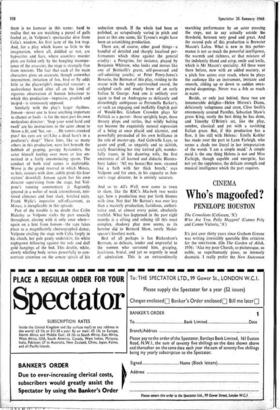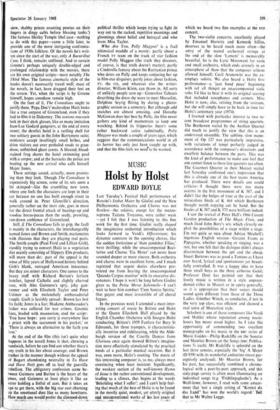The Comedians (Coliseum, 'X')
CINEMA
Who's magoofed?
PENELOPE HOUSTON
Who Are You, Polly Maggoo? (Cameo Poly and Cameo Victoria, 'A')
It's just over thirty years since Graham Greene was writing irresistibly quotable film criticism for the SPECTATOR. (On The Garden of Allah, 1936: 'Alas my poor Church, so picturesque, so noble, so superhumanly pious, so intensely dramatic. I really prefer the New Statesman
view, shabby priests counting pesetas on their fingers in dingy cafés before blessing tanks?) The famous Shirley Temple libel case—nothing to do with this paper—came a little later, to provide one of the more intriguing confronta- tions of 1930s folklore. Of the novels he's writ- ten since the start of the war, only A Burnt-Out Case, I think, remains unfilmed. And to sustain Greene's perhaps uniquely double-edged and prolonged relationship with the movies, there are his own original scripts—most notably The Third Man. The famous cinematic style of the books doesn't necessarily travel well; most of the novels, in fact, have dragged their feet on the screen. Yet, when the script is by Greene himself, hopes somehow remain high.
On the face of it, The Comedians ought to justify them. 'Papa Doc's' malevolent Haiti looks like a true outpost of Greeneland, even if they had to film it in Dahomey. The tontons nzacoute lurk in their dark glasses, like so many imitation .Jean-Luc Godard gangsters, at the end of every street; the derelict hotel is a rattling shell for two solitary guests in the John Barrymore suite; ministers accept insultingly small bribes, and drive visitors out over potholed roads to gran- diose, unfinished ghost towns. A bloated, blood- stained frog shares the hotel swimming pool with a corpse; and at the barracks the police are beating up the new arrival who calls himself Major Jones.
These settings sound, actually, more promis- ing than they look. Though The Comedians is expensively big screen, some of its sets seem a bit skimped—like the crumbling new town, where one feels the characters are kept in their car beeause no one has built enough street to walk around in. Peter Glenville's direction, generally rather on the inert side, goes in more for the direct frontal attack of beatings-up and voodoo hocus-pocus than the seedy, prowling, run-down ambience of Greeneland.
Still, if The Comedians fails to grip, the fault is mainly in the characters, the interchangeably named Jones and Brown and Smith, marionettes with illusions that they are playing real parts. The Smith couple (Paul Ford and Lillian Gish), sturdily trying to convert Haiti to a vegetarian diet mainly consisting of Slippery Elm products, will more than do: part of the appeal is the sense of fifty years of Hollywood history behind Gish's blank, outraged American innocence. But they are minor characters. One comes to the heavy stuff with Richard Burton's forlorn hotelier, lapsed Catholic and slightly charred case, with Alec Guinness's spry, joky gun- runner and with Elizabeth Taylor and Peter Ustinov as the melancholy ambassadorial couple. Guilt is lavishly spread : Brown has lost his faith; Jones is a liar; Madame Ambassador's father was collared for war crimes. Gnomic lines, loaded with mannerism, stud the script: 'You have hope: you carry it everywhere like a priest with the sacrament in his pocket,' or 'There is always an alternative to the faith you lose.'
At the end of the film (this isn't quite what happens in the novel) Jones is shot, chewing a sandwich, before he can find out whether there's any truth in his lies about courage; and Brown (rather in the manner though without the appeal
of Bogart abandoning neutrality in To Have and Have Not) goes off to lead the guerrilla rebellion. The obligatory confession scene be- tween Guinness and Burton is the heart of the piece, and Guinness at least plays it like an actor holding a fistful of aces. But it takes an age to get there, with the big star cast churning up the emotional dust like so many howitzers. HOW much one would prefer the slimmed-down
political thriller which keeps trying to fight its way out to the racked, repetitive moonings and gloomings about belief and betrayal and who loves Miss Taylor.
Who Are You, Polly Maggoo? is a frail whimsical muddle of a movie: partly about a French Tv team on the track of star fashion model Polly Maggoo (the truth they discover, of course, is that truth doesn't matter); partly a Cinderella fantasy about the Ruritanian prince who dotes on Polly and keeps conjuring her up in film-star disguises; partly jokes about fashion, Tv, the cm, and whatever else the writer- director, William Klein, can throw in. All sorts of unlikely people turn up—Genevieve Tabouis describing the dress she wore to meet Mussolini, Delphine Seyrig flitting by during a photo- graphic session in a cemetery. But although odd snatches are almost amusing, and Dorothy McGowan does her best by Polly, the film never gathers any kind of momentum to keep one watching. Behind its fripperies there's some rather backward satire (admittedly, Polly Maggoo was made a couple of years ago), which suggests that the communications world in all its horror has only just been caught up with, and that the film feels we neeSto be warned.



































 Previous page
Previous page